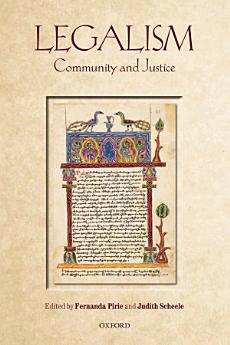Legalism: Community and Justice
Fernanda Pirie · Judith Scheele
août 2014 · OUP Oxford
Ebook
260
Pages
family_home
Admissible
info
reportLes notes et les avis ne sont pas vérifiés En savoir plus
À propos de cet ebook
'Community' and 'justice' recur in anthropological, historical, and legal scholarship, yet as concepts they are notoriously slippery. Historians and lawyers look to anthropologists as 'community specialists', but anthropologists often avoid the concept through circumlocution: although much used (and abused) by historians, legal thinkers, and political philosophers, the term remains strikingly indeterminate and often morally overdetermined. 'Justice', meanwhile, is elusive, alternately invoked as the goal of contemporary political theorizing, and wrapped in obscure philosophical controversy. A conceptual knot emerges in much legal and political thought between law, justice, and community, but theories abound, without any agreement over concepts. The contributors to this volume use empirical case studies to unpick threads of this knot. Local codes from Anglo-Saxon England, north Africa, and medieval Armenia indicate disjunctions between community boundaries and the subjects of local rules and categories; processes of justice from early modern Europe to eastern Tibet suggest new ways of conceptualizing the relationship between law and justice; and practices of exile that recur throughout the world illustrate contingent formulations of community. In the first book in the series, Legalism: Anthropology and History, law was addressed through a focus on local legal categories as conceptual tools. Here this approach is extended to the ideas and ideals of justice and community. Rigorous cross-cultural comparison allows the contributors to avoid normative assumptions, while opening new avenues of inquiry for lawyers, anthropologists, and historians alike.
Quelques mots sur l'auteur
Fernanda Pirie is University Lecturer in socio-legal studies at the University of Oxford, and Director of the University's Centre for Socio-Legal Studies. An anthropologist by training, following a career at the London Bar, she has carried out fieldwork for over a decade on the Tibetan plateau. Her studies have centred on conflict resolution, social order, and tribe-state relation. She is the author of The Anthropology of Law (2013). Judith Scheele is a social anthropologist and a post-doctoral research fellow at All Souls College, Oxford. Her research focuses on North Africa and the Sahara, in particular Algeria, Mali, and Chad. Her publications include Village Matters: Knowledge, Politics and Community in Kabylia (2009) and Smugglers and Saints of the Sahara: Regional Connectivity in the Twentieth Century (2012). The authors are among the coordinators of the Oxford Legalism project, which brings together scholars from law, history, anthropology, classics, and oriental studies in a series of seminars and workshops, to compare examples of legalistic thought, texts, and practices, from across the world.
Attribuez une note à ce ebook
Faites-nous part de votre avis.
Informations sur la lecture
Téléphones intelligents et tablettes
Installez l'appli Google Play Livres pour Android et iPad ou iPhone. Elle se synchronise automatiquement avec votre compte et vous permet de lire des livres en ligne ou hors connexion, où que vous soyez.
Ordinateurs portables et de bureau
Vous pouvez écouter les livres audio achetés sur Google Play en utilisant le navigateur Web de votre ordinateur.
Liseuses et autres appareils
Pour pouvoir lire des ouvrages sur des appareils utilisant la technologie e-Ink, comme les liseuses électroniques Kobo, vous devez télécharger un fichier et le transférer sur l'appareil en question. Suivez les instructions détaillées du centre d'aide pour transférer les fichiers sur les liseuses électroniques compatibles.





